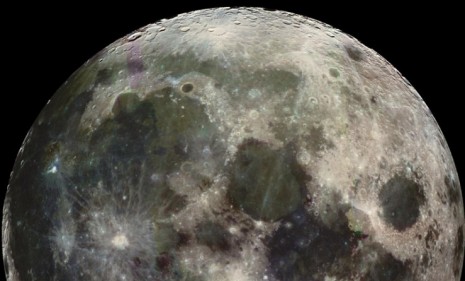Could a 'Super Moon' cause climate chaos?
Next week, the moon will make its closest approach to Earth in almost 20 years. Some fret that earthquakes, volcanic eruptions, and other disasters will follow

A free daily email with the biggest news stories of the day – and the best features from TheWeek.com
You are now subscribed
Your newsletter sign-up was successful
Keep your eyes on the night sky on March 19, also known as the evening of the extreme Super Moon, when the lunar sphere comes as close as it ever has, or will, to Earth. Some believe the astronomical event will be followed by catastrophic storms, earthquakes and other natural disasters. Here's why:
What exactly is a "Super Moon"?
The term refers to the unusually large new (or full) moon that earthlings see when the moon travels almost as close as it can to Earth. An "extreme Super Moon" occurs when the moon reaches its absolute closest point. On March 19, the moon will be only 221,556 miles away — the first extreme Super Moon in nearly 20 years.
The Week
Escape your echo chamber. Get the facts behind the news, plus analysis from multiple perspectives.

Sign up for The Week's Free Newsletters
From our morning news briefing to a weekly Good News Newsletter, get the best of The Week delivered directly to your inbox.
From our morning news briefing to a weekly Good News Newsletter, get the best of The Week delivered directly to your inbox.
Should we be concerned?
Those who believe in horoscopes might be. Some astrologers (not astronomers) say this natural wonder signals the beginning of a "moonageddon," coinciding with enormous storms, earthquakes and floods. Kit Karson at Psychic Cosmos further predicts that the financial markets could collapse as prices surge into "panic mode."
Is this for real?
Astrologists point to history to validate their predictions, says Ben Yakas at Gothamist. Both the New England hurricane of 1938 and the Australian Hunter Valley floods of 1955 happened during Super Moons, they say. The last Super Moon came in 2005, at around the same time as Hurricane Katrina and the Indonesian tsunami.
A free daily email with the biggest news stories of the day – and the best features from TheWeek.com
Is there any science backing these theories up?
Absolutely none, says Pete Wheeler of the International Center for Radio Astronomy. All that will happen next week is that the Earth will experience a "lower than usual low tide and a higher than usual high tide." A Super Moon, he concludes, is "nothing to get excited about."
But what about extreme weather during past Super Moons?
It's just coincidence, says astronomer David Reneke. "'If you try hard enough you can chronologically associate almost any natural disaster or event to anything in the night sky." In the past, he adds, people thought the sun would be pulled apart when the planets aligned. "It didn't happen." And the catastrophic events cited by excitable astrologers didn't even happen that close to Super Moons, points out John Metcalfe at TBD. The Hunter river flooded in February 1955, "two whole months before and after bookending Super Moons."
Sources: Accuweather, News.com.au, Gothamist, TBD, Psychic Cosmos
-
 Is Andrew’s arrest the end for the monarchy?
Is Andrew’s arrest the end for the monarchy?Today's Big Question The King has distanced the Royal Family from his disgraced brother but a ‘fit of revolutionary disgust’ could still wipe them out
-
 Quiz of The Week: 14 – 20 February
Quiz of The Week: 14 – 20 FebruaryQuiz Have you been paying attention to The Week’s news?
-
 The Week Unwrapped: Do the Freemasons have too much sway in the police force?
The Week Unwrapped: Do the Freemasons have too much sway in the police force?Podcast Plus, what does the growing popularity of prediction markets mean for the future? And why are UK film and TV workers struggling?